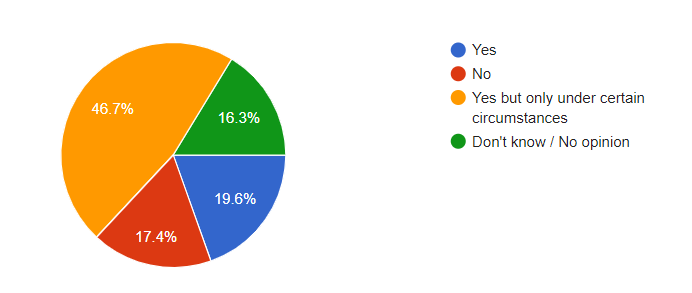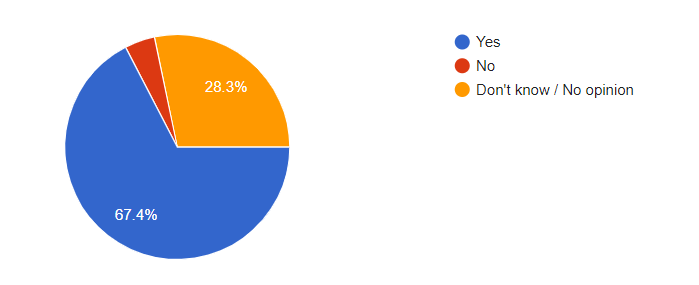Do NFL fans even like analytics? What about PFF grades? Running backs? What the survey says
Why I went from pro-analytics to anti-analytics to just wishing people would be better to running backs
I first started writing about NFL analytics about 10 years ago, long before people were arguing over PFF grades on Twitter, talking about EPA on ESPN, or forcing gripes online over a team’s willingness to draft a running back in the first round. In fact, while I can’t say how early other people were writing or pondering the value of running backs, I can say that I was among those who predicted the downfall of the position well before it happened.
I even once saw a tweet by Ben Baldwin, long before the tens of thousands of followers had arrived and there were many more fans around the country who, love him or hate him, have become aware of his commitment to analytics, and asked him to write an article about it. He did, the post went viral (thank you, Ben), and I honestly would’ve never guessed that he’d still be tweeting about running backs not mattering four years later.
But then again, I would’ve never guessed back then that I’d ever stop tweeting. Or that I’d eventually come to realize that the “running backs don’t matter” argument and many other beliefs from analytics-based research are at least as flawed as those that come from “watching film” or “playing football”. There’s as much nuance, value, and margin of error in using statistics based on the past to make a decision in the present under ever-unique circumstances as there is when you “go with your gut.”
I used to be staunchly pro-analytics. I had a weekly series called Seahawks Advanced Stats (before “analytics” became the catch-all) and I rounded up every non-traditional number that I could find from sites like FootballOutsiders (before they had a paywall), PFF (before they had a paywall), a site called NFLAdvancedStats, and STATHEAD on Pro-Football-Reference (before they had a paywall). (I pay for all the paywalls now, except PFF.) Back then, we didn’t even know that PFF would go boom and that DVOA would never crack through the football lexicon. If anything, FootballOutsiders had the leg up by getting an early partnership with ESPN. But then PFF got bought by Cris Collinsworth and Sunday Night Football is the most popular TV show in America.
The most popular TV show in America. Stars Cris Collinsworth, Al Michaels, and often guest starring Tom Brady.
I then became anti-analytics, if only because it started to feel like being pro-analytics was really just being pro-argument. Everything becomes about “me” when you actively participate in a fake day-to-day war with “them” that you can literally never win. It felt like talking about analytics became more about how I know things about football that you don’t and the content was less about actual football. Analytics as a whole seemed to become less about informing people about the game in a way that could be useful, which was always the tone that I felt from following baseball analytics in the early days of FanGraphs, and more about how there’s a bunch of people who are stupid and aren’t we great for being smarter?
But how can you win a war when there are no stakes, objectives, defined enemies, or rules? It’s simply a copy, paste, repeat of the same day over and over again for people who constantly fight for analytics because when the entire world of opinions is at the click of your fingertips it means that you will literally never run out of people to dunk on. There are hundreds of millions of people in America and we know that covers a wide spectrum of personalities, and we don’t have this expectation when we go out in the world that they all have to be like me, think like me, and behave like me.
Anyone who would go out in the world and do that would be the exact person you’d actually avoid in the real world because they’re typically holding up a sign and screaming at the top of the lungs at you.
But interestingly on Twitter everyone is kind of put on this even playing field and told that you’re either with me or your against me. This is by design, of course.
So I am no longer anti-analytics either. It didn’t take me as long to see the errors of my ways in being anti-analytics as it did for me to look in the mirror as someone who was pro-analytics, but I have to admit I still let my ego get the better of me in channeling so much resentment that I had for people who I felt were just being a little stubborn into a mission to prove that analytics are being overrated solely out of their innate passion to win this made-up war.
I used to say that running backs do not matter. Then I argued that they do matter. Now I mostly just feel bad for running backs and wish they got treated better by the NFL and especially by the fans who are more tied up in fantasy sports or analytics than they are aware of the fact that these players will sacrifice their bodies not only for their entertainment but also for the right to feel very good about themselves online.
Running backs remain among the most integral figures that sell football games — Derrick Henry, Jonathan Taylor, even Rashaad Penny are way more popular than the vast majority of all defensive players and virtually all offensive linemen — and yet they will have the shortest careers, suffer the most injuries, and make the least amount of money.
Do they matter? If they don’t, stop giving them the ball then.
Oh, I know, we have that argument too. But the fact remains that offenses with strong rushing attacks are better off than those that were solely built to pass the ball. The fact is that the argument is mostly centered on the very minor detail that teams are better off drafting running backs on day two than they are on day one. It is still the highest-draft running backs who usually go on to become household names in the NFL.
Then the next argument is about how sometimes team “overpay” a running back, even though running backs are essentially now the lowest-paid non-special teams players next to safeties, guards, and tight ends. The reason that a team like the Carolina Panthers pays Christian McCaffrey or the LA Rams pay Todd Gurley is not necessarily just because of on-field value or because of a belief that they won’t be injured, but simply a monetary risk based on them being the most popular players on the team.
That risk does sting when players like McCaffrey and Gurley get injured, as it does when Saquon Barkley goes down, but then this gets twisted into feigned anger over the Raiders paying Kenyan Drake $11 million over two years and I’m like, “Yeah, this is a little too much for me.”
Seinfeld once had an episode where George and Kramer weren’t in it and Jason Alexander was so upset that he told Larry David, “If you write me out again, do it permanently” and “If you don’t need me here, I don’t want to be here.”
I need running backs to be here. We all do. That’s what I want for running backs more than I want to talk about how it hurts me personally when a guy on TV tears his ACL. No, I’m pretty sure that hurt him.
So to Ben, I totally see your point. You’ve made a good argument. I remember what it was like before that article and I know what it’s like now to receive text messages and e-mails from people who root for teams all over the country linking me to one of your tweets. For all sorts of reasons and with all sorts of emotions.
Analytics are something that has impacted football in ways that I expected and ways that I never saw coming, no matter what side I stood on. Now I just enjoy being an analytics observer.
This week I sent out a survey in the Seaside Joe newsletter (sign up here) in which I asked fans 10 questions based around “analytics” and I put that in quotes because I intend for this survey to be very basic, general. Something to use as a jumping off point for future, more-detailed surveys about analytics. Truthfully, I don’t know how many people actually care or even know about “analytics” because I do know that Twitter is not a useful sample of the population.
It’s Twitter people. Not even Twitter people, Twitter-tweeting people. That’s somewhere on the spectrum of human personalities.
I will keep the survey open for anyone who comes across this post today and update the results if there are many more answers. You can take it, 10 questions, right here. But you will have the option to “cheat” and get a preview of the results if you continue to read before answering the questions.
I’ll wait.
Okay.
Time to post the results.
Do you like "analytics"?
Should the Seahawks use more "analytics"?
In some ways, the Seahawks were actually at the forefront of using analytics-based preparation for football. But in other, more perceptible ways, Pete Carroll is not as aggressive or pass-happy as many would prefer.
Should the Seahawks go for it more often on 4th down?
This is an easy one. People hate punts, but now they especially hate them because many teams are punting less often, and that understandably builds up resentment and frustration.
Should the Seahawks pass more and run less?
Frequency of pass/run balance seems to be less of an analytics-based sticking point, but Seattle’s eagerness to add running back talent over running certain schemes and finding Elijah Mitchell or Raheem Mostert instead, is a more common complaint.
Should the Seahawks pay Rashaad Penny whatever it takes to keep him even though he’s a running back?
It’s still somewhat surprising that 22-percent of people want to keep Penny at roughly any cost, and based on basically one month of football. But less surprising when you consider that month of football.
If the Seahawks drafted a running back with their first pick, would you be upset?
Seattle picks 41st overall and doesn’t have a first round pick so there’s going to be more pressure on whoever the Seahawks’ second round pick is than perhaps in some years; especially if Seattle trades down again. 62-percent of respondents said that taking a running back there would upset them, though Jonathan Taylor was also the 41st overall pick.
Does Pete Carroll need to hire an analytics expert?
75-percent of respondents voted that Carroll does or might need to hire an analytics “expert” and I didn’t define what that meant at all!
Do you like PFF grades?
Do people overrate PFF grades?
Almost as many people who said they like PFF grades (Yes or Yes under certain circumstances) also said PFF grades are overrated.
Do people overrate analytics?
Similarly, we know that most people “like” analytics, but most people also find analytics to be overrated. That’s not very specific, so I’ll have to refine the questions, but it is pretty telling.
Despite analytics seemingly winning the war on Twitter, they don’t have a ton of support in this one poll question, probably based on how they are actually perceiving the war on Twitter.












